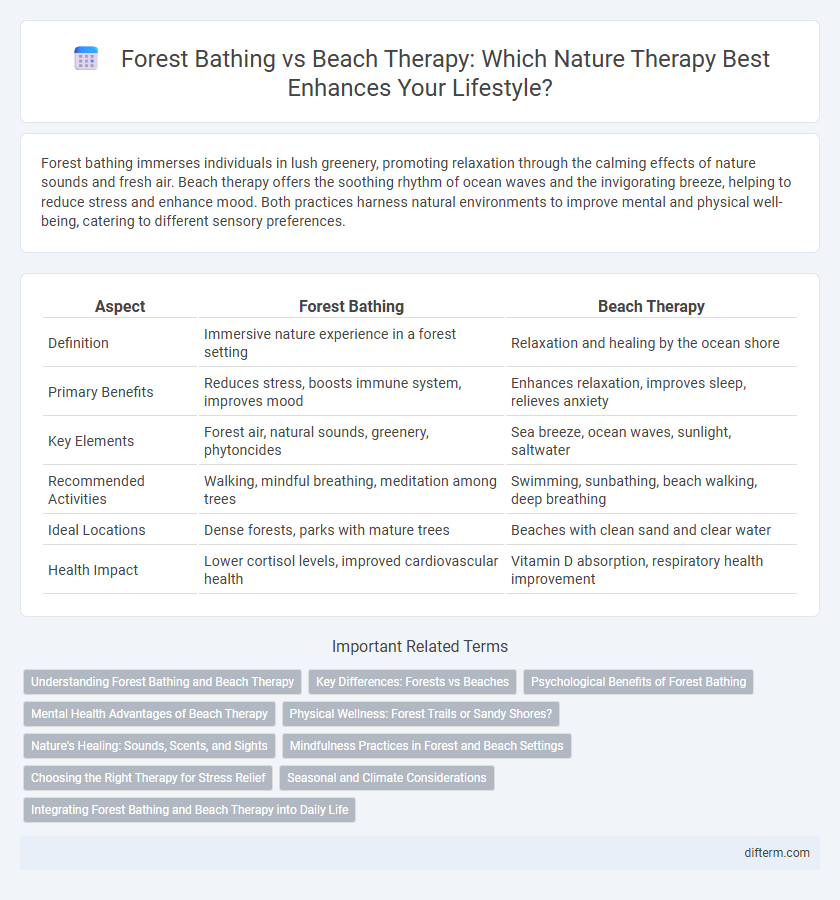Forest bathing immerses individuals in lush greenery, promoting relaxation through the calming effects of nature sounds and fresh air. Beach therapy offers the soothing rhythm of ocean waves and the invigorating breeze, helping to reduce stress and enhance mood. Both practices harness natural environments to improve mental and physical well-being, catering to different sensory preferences.
Table of Comparison
| Aspect | Forest Bathing | Beach Therapy |
|---|---|---|
| Definition | Immersive nature experience in a forest setting | Relaxation and healing by the ocean shore |
| Primary Benefits | Reduces stress, boosts immune system, improves mood | Enhances relaxation, improves sleep, relieves anxiety |
| Key Elements | Forest air, natural sounds, greenery, phytoncides | Sea breeze, ocean waves, sunlight, saltwater |
| Recommended Activities | Walking, mindful breathing, meditation among trees | Swimming, sunbathing, beach walking, deep breathing |
| Ideal Locations | Dense forests, parks with mature trees | Beaches with clean sand and clear water |
| Health Impact | Lower cortisol levels, improved cardiovascular health | Vitamin D absorption, respiratory health improvement |
Understanding Forest Bathing and Beach Therapy
Forest bathing, or shinrin-yoku, involves immersing oneself in a forest environment to enhance mental clarity and reduce stress through sensory engagement with nature. Beach therapy centers on the calming influence of coastal settings, utilizing the sound of waves, fresh sea air, and sunlight to improve mood and promote relaxation. Both practices leverage natural elements to foster emotional well-being and physical health, yet forest bathing emphasizes woodland ecosystems while beach therapy highlights marine surroundings.
Key Differences: Forests vs Beaches
Forest bathing immerses individuals in dense, tranquil woodlands, promoting stress reduction through phytoncides released by trees and a multisensory connection to nature. Beach therapy offers a unique sensory experience with the calming sound of waves, saline air rich in negative ions, and expansive horizons that foster mental clarity and relaxation. While forests provide shaded, oxygen-rich environments enhancing respiratory health, beaches deliver open, sunny settings that encourage vitamin D absorption and mood elevation.
Psychological Benefits of Forest Bathing
Forest bathing, also known as shinrin-yoku, enhances mental well-being by reducing cortisol levels and alleviating symptoms of anxiety and depression. Immersion in natural forest environments promotes mindfulness, improves mood, and boosts cognitive function through exposure to phytoncides and natural sensory stimuli. Studies reveal significant improvements in attention restoration and emotional regulation compared to urban settings, highlighting its psychological benefits over alternative therapies like beach therapy.
Mental Health Advantages of Beach Therapy
Beach therapy offers significant mental health advantages by promoting relaxation through the rhythmic sound of waves and natural sunlight exposure, which enhances serotonin production. The sandy shores encourage physical activity like walking or swimming, boosting endorphin levels and reducing stress hormones such as cortisol. Studies show that proximity to ocean environments correlates with lower anxiety and improved mood regulation compared to urban or forest settings.
Physical Wellness: Forest Trails or Sandy Shores?
Forest bathing enhances physical wellness through gentle exercise on uneven forest trails, promoting cardiovascular health and boosting immunity by exposure to phytoncides. Beach therapy offers low-impact benefits, with walking on sandy shores improving muscle strength and joint flexibility while the ocean air supports respiratory function. Both environments reduce cortisol levels and encourage mindfulness, vital for overall physical health and stress reduction.
Nature's Healing: Sounds, Scents, and Sights
Forest bathing immerses individuals in the calming sounds of rustling leaves, the earthy scent of pine and moss, and the sight of dense green foliage, promoting stress reduction and mental clarity. Beach therapy offers the rhythmic sound of crashing waves, the salty sea breeze infused with marine life scents, and expansive ocean views that enhance relaxation and rejuvenation. Both experiences harness nature's multisensory healing elements to improve emotional well-being and reduce anxiety.
Mindfulness Practices in Forest and Beach Settings
Forest bathing enhances mindfulness by immersing individuals in rich natural sounds, fresh air, and verdant greenery that promote deep sensory awareness and stress reduction. Beach therapy cultivates mindfulness through rhythmic waves, expansive horizons, and the tactile sensation of sand and saltwater, encouraging present-moment focus and emotional balance. Both practices leverage unique environmental stimuli to improve mental clarity, reduce anxiety, and support holistic wellbeing.
Choosing the Right Therapy for Stress Relief
Forest bathing immerses individuals in dense woodland environments, promoting stress relief through natural phytoncides and sensory engagement, while beach therapy leverages ocean waves and salty air to reduce cortisol levels and enhance mood. Selecting the appropriate therapy depends on personal preferences for sensory stimuli and accessibility to natural settings, with forest bathing favored for deep relaxation and beach therapy for rejuvenating energy. Scientific studies confirm both methods effectively lower stress markers, supporting personalized choices in holistic mental health routines.
Seasonal and Climate Considerations
Forest bathing offers an immersive experience in lush greenery that thrives in temperate and humid climates, making it ideal for spring and autumn when foliage is vibrant and air quality is high. Beach therapy suits warmer, coastal regions where sunny, mild winters allow year-round access to seawater and sandy shores, promoting relaxation and vitamin D absorption. Seasonal shifts influence the choice between forest trails rich in phytoncides and ocean breezes infused with negative ions, guiding individuals toward the best environment for mental and physical rejuvenation.
Integrating Forest Bathing and Beach Therapy into Daily Life
Integrating forest bathing and beach therapy into daily life enhances mental clarity by immersing the senses in natural environments rich in bioactive compounds and soothing sounds of waves. Regular exposure to forest air boosts immune function through phytoncides, while beach therapy promotes relaxation and stress reduction via negative ions and natural sunlight. Scheduling brief walks in wooded areas or coastal visits maximizes health benefits, supporting holistic well-being and emotional balance.
Forest Bathing vs Beach Therapy Infographic

 difterm.com
difterm.com